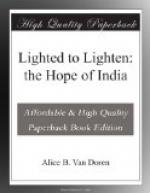Rupert Brooke has sung of the summons of the World War that cleansed the heart from many pettinesses. His words apply equally well to this service of human need which has been called “war’s moral equivalent.”
“Now, God be thanked,
Who has matched us with His
hour,
And caught our youth,
and wakened us from sleeping,
With hand made sure,
clear eye, and sharpened
power,
To turn, as swimmers
into cleanness leaping,
Glad from a world grown
old and cold and weary.”
AN EXAMPLE OF CHRISTIAN TREATMENT
Volumes might be written on the atrocities and absurdities of wizards, quack doctors, and the hideous usages of native midwifery. The ministry of Christian physicians comes as a revelation to the tortured victims.
The scene is a ward in a Christian Hospital for women in South India. The patients in adjacent beds, convalescents, converse together.
“What’s the matter with you?” says Bed No. 1 contentedly. “My husband became angry with me, because the meal wasn’t ready when he came home and he cut my face. The Doctor Miss Sahib has mended me, she has done what my own mother would not do.” Said another in reply to the question, “The cow horned my arm, but until I got pneumonia I couldn’t stop milking or making bread for the father of my children, even if it was broken. The hospital is my Mabap (mother-father).”
“What care would you get at home?” chimed in another who had been burning up with fever. “Oh! I would be out in the deserted part of the woman’s quarters. It would be a wonderful thing if any one would pass me a cup of water,” she replied. From another bed, a young wife of sixteen spoke of having been ill with abscesses. “One broiling day,” she said, “I had fainted with thirst. The midwives had neglected me all through the night, and, thinking I was dying, they threw me from the cord-bed to the floor, and dragged me down the steep stone staircase to the lowest cellar where I was lying, next to the evil-smelling dust-bin, ready for removal by the carriers of the dead, when the Doctor Miss Sahib found me and brought me here. She is my mother and I am her child.”
An old woman in Bed No. 4 exhorts the patients around her to trust the mission workers. “I was against them once,” she tells them, “but now I know what love means. Caste? What is caste? I believe in the goodness they show. That is their caste.”
Words profoundly wise!
On the slope of the desolate river among the tall grasses I asked her, “Maiden, where do you go shading your lamp with your mantle? My house is all dark and lonesome,—lend me your light!” She raised her dark eyes for a moment and looked at my face through the dusk. “I have come to the river,” she said, “to float my lamp on the stream when the daylight wanes in the west.” I stood alone among tall grasses and watched the timid flame of her lamp uselessly drifting in the tide.




